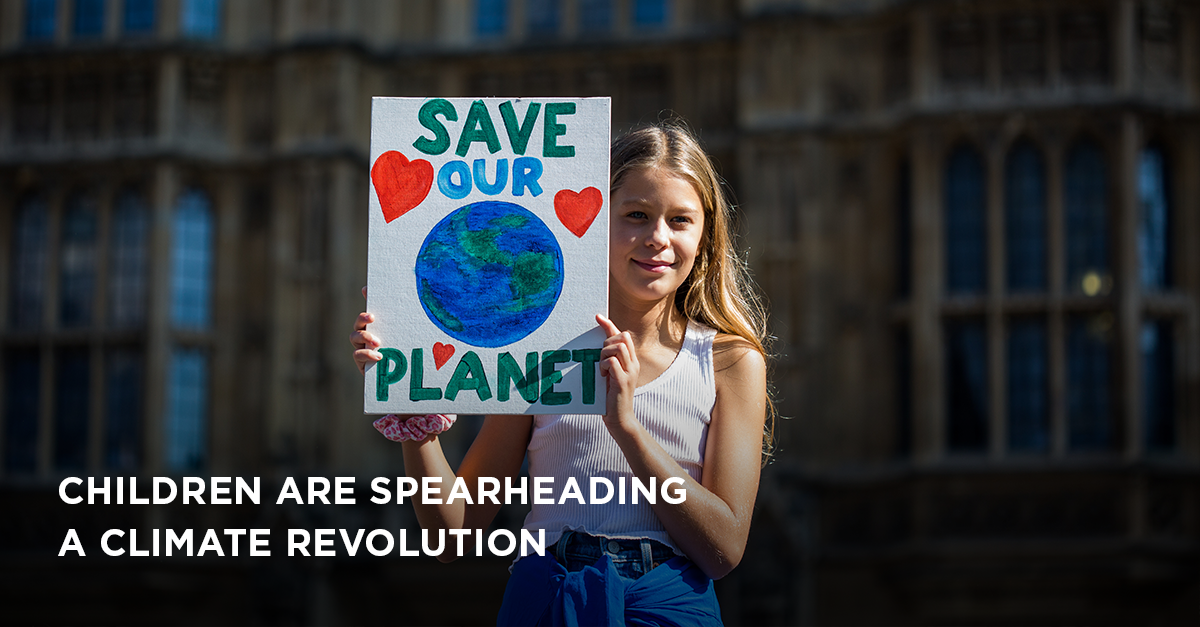Our children have realized that they will inherit a climate crisis because of the actions of the generations that came before them, and they look far from happy. Over the past year or so, one of the recurring motifs in mainstream media is the involvement of children in climate change advocacy. Movements such as ‘Fridays for Future’, ‘Youth for Climate’ and ‘Climate Strike’ have acted as a platforms for children taking to the streets, to raise their voices against what they see as a lack of initiative among policy makers in dealing with the growing climate crisis. As someone who subscribes to the premise that education is the movement from darkness to light, I believe children belong in school and not on the streets protesting. Therefore, when I first came across these movements, and the emergence of young leaders like Greta Thunberg, I approached the news with a mix of curiosity and concern.
The Greta Effect
Hailing from one of the most educated and progressive countries in the world, Greta Thunberg is a 16-year-old Swedish girl who finds herself at the forefront of a children-led climate revolution. When she was 15, Greta took exception to what she saw as inaction on the issue, and decided to dedicate her Fridays to stage a solitary protest in front of the Swedish Parliament at the expense of missing school. Asked about her rationale for skipping school, Greta retorted, “Why should we study for a future that may not exist?”
After several Fridays of solitary protests, Greta began to draw both wanted and unwanted attention. The ripple effect of her activism went as far as Australia, where children took to the streets on Fridays, and soon the movement found takers in over 125 countries, bringing many cities to a standstill. I recall a video report about one such protest, in which an Australian girl criticized global leaders, saying, “You are the reason I’m here today, and if you want me to go back to school, you know exactly what needs to be done”. At another protest, a young boy from Florida said that his activism was fueled by his fear that the island he lived on would be gradually engulfed by rising sea level. Greta’s solitary protest had snowballed into civil disobedience, drawing legions of school goers and capturing the imagination of the general population and the undivided attention of global policy makers.
There is an old saying that change begins at home, and Greta exemplified it by promoting upcycling and veganism in the Thunberg household, and even went to the extent of refraining from air travel. Her parents, for their part, have stood in solidarity with Greta as well. When asked about why the family was allowing Greta to protest when she should be at school, Svante Thunberg, her father, reportedly said that the impact of the protest would not have been the same, had she done so on Sundays instead of a school day, such as Friday.
Greta has since made multiple trips across the Atlantic, on zero-emission sailboats, staying committed to the cause of reducing carbon emissions. Meanwhile, she made several emotionally-charged speeches on the world stage, and on one such occasion famously said, “We are angry. You are robbing our future. Change is coming, whether you like it or not”.
Political tussle
The kernel of Greta’s movement targets political inaction, in addressing climate change, so it’s not surprising that the response to it has been politicized as well. U.S. President Donald Trump, German Chancellor Angela Merkel and French President Emmanuel Macron have been critical of Greta to varying degrees, particularly in the wake of lawsuits filed against their respective countries for failing to meet Paris Agreement targets. Vladimir Putin, on the other hand, described Greta as kind and sincere, before criticizing her for being “poorly informed”. While the left-leaning parties and tabloids have regarded her as a ‘Saint of Environmentalism’, one French right-wing politician went as far as calling her the ‘Guru of Apocalypse’.
Irrespective of how Greta divides opinion in the hallways of political power, it is hard to deny the courage and sincerity in her convictions, and this has won her a lot of support. One of the climate strikes helmed by her in September drew around four million supporters. In the span of a year, Greta has gone from being a lone protestor on one day of the week, to becoming a Nobel Peace Prize nominee and the Time magazine’s Person of the Year 2019, which attests to her meteoric success and vast support. Just the other day, I noticed a tweet about Greta from President Donald Trump himself. She may not have the approval of the ‘Leader of the Free World’, but she has his attention, which is more than an average teenage environmentalist from Sweden could ever have asked for. “We will make them hear us,” Greta had once proclaimed, and this certainly appears to be happening.
The way forward
According to me, climate change is not a partisan issue, but an existential crisis. We are fast approaching a point of no return on the issue, which essentially puts us in a race against time. Children have the most at stake, as they stand to bear the brunt of the consequences, despite not being responsible for the actions that have driven us to this point. I believe that climate change warrants a cross-generational revolution, and Greta has already lit the spark for one. Much like society at large, which has responded to the concerns children around the world are raising, policy makers too should take cognizance of this gathering opinion and respond with concrete actions and initiatives. There has never been a better cue for action on the climate crisis, than four million children protesting on the streets. The time for talk and deliberations is running out, what the world needs is action, and it needs it now!

